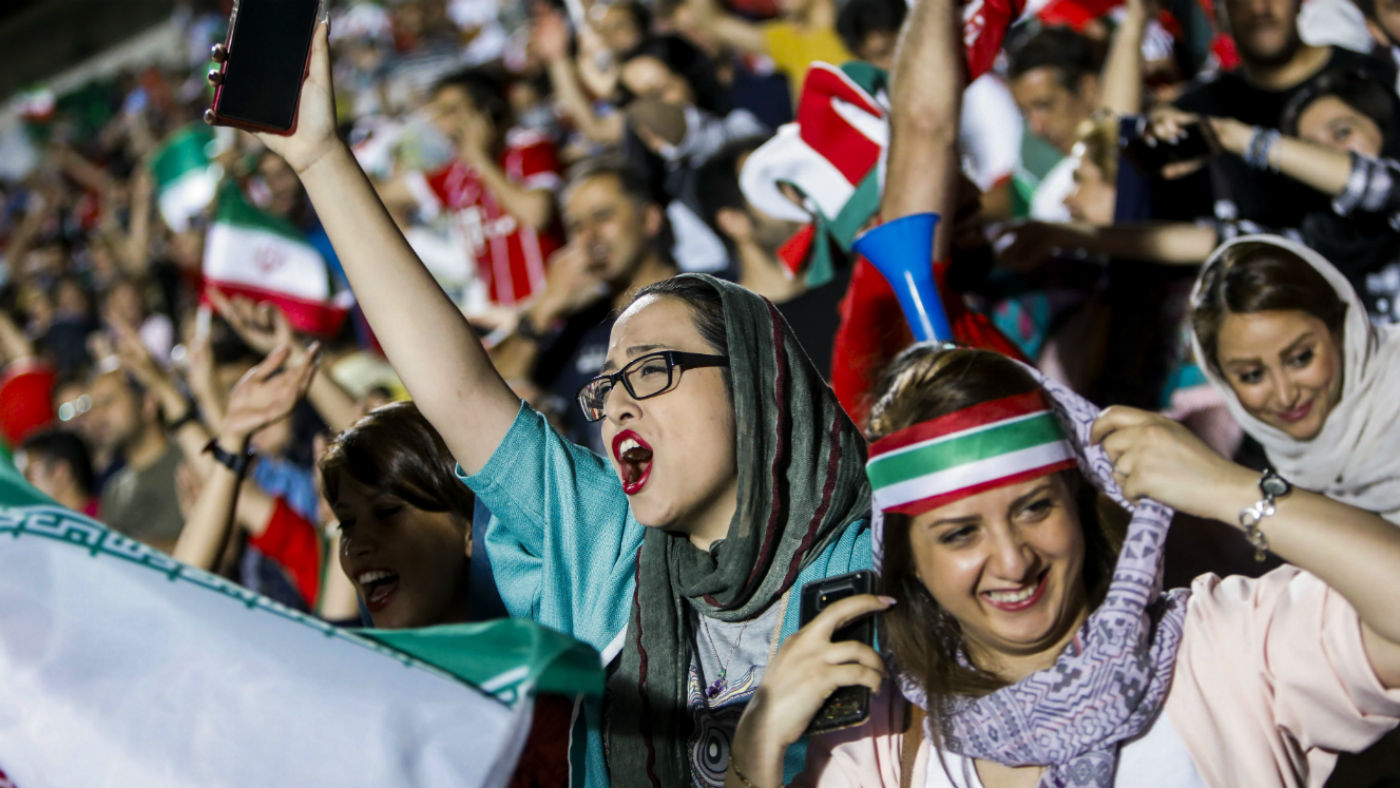Iranian women allowed to watch World Cup after sit-in protest
Interior minister orders police to allow female fans into Azadi Stadium, despite 40-year ban

A free daily email with the biggest news stories of the day – and the best features from TheWeek.com
You are now subscribed
Your newsletter sign-up was successful
Iran played Spain in the World Cup last night, and excitement was high in Tehran, where the game was to be broadcast live in the capital’s Azadi Stadium.
For 40 years, women have been unable to watch the national side in person, due to a ban on female spectators at male sporting events.
This led to the unusual sight of female Iran fans crowding the stands in Russia to cheer on the team during their opening match against Morocco on Friday, while their sisters at home remain locked out of the country’s own stadiums.
The Week
Escape your echo chamber. Get the facts behind the news, plus analysis from multiple perspectives.

Sign up for The Week's Free Newsletters
From our morning news briefing to a weekly Good News Newsletter, get the best of The Week delivered directly to your inbox.
From our morning news briefing to a weekly Good News Newsletter, get the best of The Week delivered directly to your inbox.
On Tuesday the governor of Tehran announced that the prohibition on mixed-gender stadiums would be temporarily lifted to allow female fans to a live broadcast of the Iran-Spain match in a designated “family” stand.
However, hours before kick-off, the capital’s police said the plans to allow a mixed-gender viewing could not go ahead, citing “infrastructure” issues.
Ticket-holders refused to leave, staging an impromptu sit-in protest outside the stadium.
Video footage shows men, women and children sitting on the ground in front of a line of police. Many fans carried banners and horns, while some female supporters wore a patriotic Iranian flag headscarf.
A free daily email with the biggest news stories of the day – and the best features from TheWeek.com
The stand-off continued more than an hour, until Iran’s interior minister intervened to order police to allow all fans inside and let the viewing party go ahead as planned.
“It marked the first time since 1981 that women were allowed in Azadi Stadium to watch a soccer game with men,” Sports Illustrated reports.
Unfortunately, that was the only victory of the night - despite giving the Spanish side a run for their money, Iran ultimately lost the match 1-0.
“It remains to be seen whether Wednesday's event signals a permanent shift in allowing Iranian women to watch men's sporting events,” says CNN.
-
 Should the EU and UK join Trump’s board of peace?
Should the EU and UK join Trump’s board of peace?Today's Big Question After rushing to praise the initiative European leaders are now alarmed
-
 Antonia Romeo and Whitehall’s women problem
Antonia Romeo and Whitehall’s women problemThe Explainer Before her appointment as cabinet secretary, commentators said hostile briefings and vetting concerns were evidence of ‘sexist, misogynistic culture’ in No. 10
-
 Local elections 2026: where are they and who is expected to win?
Local elections 2026: where are they and who is expected to win?The Explainer Labour is braced for heavy losses and U-turn on postponing some council elections hasn’t helped the party’s prospects
-
 Will increasing tensions with Iran boil over into war?
Will increasing tensions with Iran boil over into war?Today’s Big Question President Donald Trump has recently been threatening the country
-
 Epstein files topple law CEO, roil UK government
Epstein files topple law CEO, roil UK governmentSpeed Read Peter Mandelson, Britain’s former ambassador to the US, is caught up in the scandal
-
 Iran and US prepare to meet after skirmishes
Iran and US prepare to meet after skirmishesSpeed Read The incident comes amid heightened tensions in the Middle East
-
 Which way will Trump go on Iran?
Which way will Trump go on Iran?Today’s Big Question Diplomatic talks set to be held in Turkey on Friday, but failure to reach an agreement could have ‘terrible’ global ramifications
-
 Israel retrieves final hostage’s body from Gaza
Israel retrieves final hostage’s body from GazaSpeed Read The 24-year-old police officer was killed during the initial Hamas attack
-
 China’s Xi targets top general in growing purge
China’s Xi targets top general in growing purgeSpeed Read Zhang Youxia is being investigated over ‘grave violations’ of the law
-
 Panama and Canada are negotiating over a crucial copper mine
Panama and Canada are negotiating over a crucial copper mineIn the Spotlight Panama is set to make a final decision on the mine this summer
-
 Iran unleashes carnage on its own people
Iran unleashes carnage on its own peopleFeature Demonstrations began in late December as an economic protest